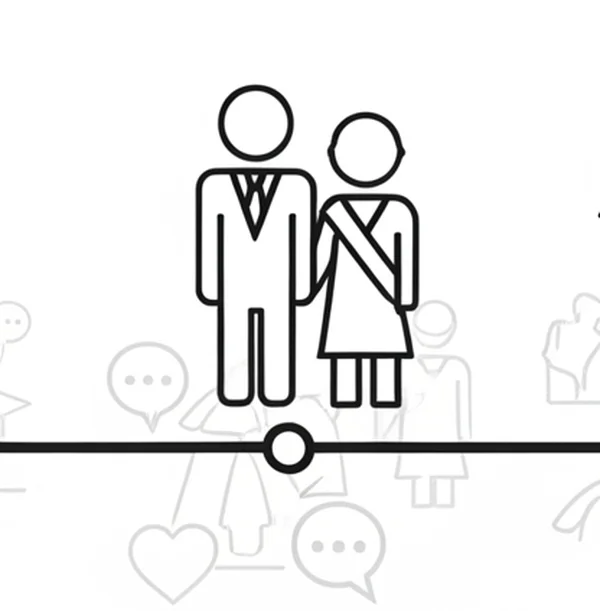Can Your Love Language Change? Exploring the Evolution of Needs
June 9, 2025 | By Hannah Carter
The concept of the 5 Love Languages offers a powerful lens through which we understand how love is given and received. Many of us identify strongly with a primary love language, but have you ever wondered, can love language change over time? Is the way you felt loved as a young adult the same way you feel loved now, after years of different experiences and evolving relationships? This article explores the fascinating question of love language evolution, delving into the potential for changing love language preferences and the factors that might influence such shifts. If you're curious about your current needs, you can always re-discover your love language profile on our site.
Understanding the Foundation: What Are Primary Love Languages?
Before we discuss whether your love language can change, it's essential to briefly revisit what they are. What are the 5 basic love languages? They are:
- Words of Affirmation: Feeling loved through verbal praise, appreciation, and encouragement.
- Acts of Service: Feeling loved when someone does thoughtful things for you.
- Receiving Gifts: Feeling loved through tangible symbols of affection and thoughtfulness.
- Quality Time: Feeling loved through undivided attention and shared experiences.
- Physical Touch: Feeling loved through hugs, holding hands, and other forms of physical affection.
A Quick Recap of the Five Core Ways We Feel Loved
Most individuals find that one or two of these languages resonate more deeply with them than the others. These become their primary love languages, the main channels through which they feel most cherished and understood. This understanding forms the bedrock of effective relationship communication.
The Concept of a Dominant Love Language
While we might appreciate all five to some degree, a dominant love language is the one that, if unmet, can leave us feeling unloved, even if other expressions of care are present. Identifying this dominant language is a key step in improving emotional connection.
The Case for Stability: Why Some Love Languages Remain Constant
There's a strong argument for the love language stability in many individuals. Do love languages stay the same? For some, yes, or at least their primary one does.

Deep-Rooted Preferences from Early Experiences
Our upbringing and early formative relationships can significantly shape our preferred ways of receiving love. If a child consistently received affection through comforting hugs (Physical Touch) or verbal encouragement (Words of Affirmation), these preferences might become deeply ingrained and remain influential throughout life. These childhood influences can be powerful.
Connection to Core Personality Traits
Some love languages may align closely with inherent personality traits. For example, someone who is naturally very practical and action-oriented might consistently value Acts of Service. These personality links can contribute to the stability of a love language.
The Comfort of Familiar Expressions of Love
There's a certain comfort and predictability in knowing how one feels loved. A stable love language provides a reliable framework for understanding and navigating relationship dynamics. The familiarity of these expressions can be deeply reassuring.
Factors That Can Influence a Change in Your Love Language
Despite the arguments for stability, there's compelling evidence and anecdotal experience suggesting that our love language can change. What causes a love language to change? Several factors can contribute to this love language evolution.

Significant Life Events (Marriage, Parenthood, Loss)
Major life transitions often bring about new needs and priorities.
- Marriage/New Serious Relationship: Initially, the excitement might make all love languages feel potent. Over time, as the relationship settles, specific needs might emerge more clearly, potentially shifting what feels most impactful.
- Parenthood: The demands of raising children can drastically alter how one needs to receive support and love. A new parent might suddenly value Acts of Service (help with the baby) far more than before, even if Quality Time was previously primary.
- Loss or Trauma: Experiencing grief or trauma can change one's emotional landscape, leading to a craving for different kinds of comfort and support, thus influencing their changing love language.
Personal Growth and Self-Discovery
As we mature and engage in personal development, our understanding of ourselves and our needs deepens. This journey of self-discovery can lead to a re-evaluation of what truly makes us feel loved, potentially leading to a shift in our primary love language.
Relationship Dynamics and Partner's Influence
Being in a relationship with someone who consistently expresses love in a particular way can, over time, heighten our appreciation for that language. Conversely, if a primary love language is consistently unmet, we might adapt or develop a stronger appreciation for another language that is being offered. These relationship dynamics love language interactions are crucial.
Unmet Needs Leading to a Shift in Priorities
If a person consistently feels a deficit in one area of how they receive love, their "love tank" for that language might run dry. They might then become more receptive to or even prioritize other languages that are being spoken by their partner or those around them. This is a common reason for shifting emotional needs.
How Life Stages and Experiences Shape Our Love Language Evolution
The evolution of love language is often tied to our journey through life. Does your love language change with age? It certainly can.

Love Languages in Young Adulthood vs. Later Life
A young adult focused on building a career and independence might initially prioritize Words of Affirmation (encouragement) or Acts of Service (practical support). Later in life, with more established security, Quality Time or Physical Touch (intimacy and comfort) might become more prominent.
Impact of New Relationships or Relationship Endings
Starting a new relationship after a previous one ended can bring fresh perspectives on what one needs and values. Past hurts or positive experiences can reshape how we define and seek love, leading to a change in love language preference.
How Children Can Influence a Parent's Love Language Needs
For parents, especially new ones, the sheer exhaustion and need for practical help can elevate Acts of Service to a primary position. The need for emotional support might also heighten the importance of Words of Affirmation. You can explore this further by considering if it's time to retake the love language test.
Recognizing a Shift: Signs Your Love Language Might Be Changing
How can you tell if your love language is changing or has already changed? What are the signs my love language changed?

Old Ways of Feeling Loved No Longer Resonate
Actions or words that used to make you feel deeply cherished now feel less impactful or even fall flat. The "magic" isn't there anymore.
New Cravings for Different Types of Affection
You find yourself yearning for a different kind of attention or care than you used to. For example, you might start wishing for more quality conversation (Quality Time) even if you previously prioritized gifts.
Feeling Misunderstood Despite Partner's Efforts
Your partner might be diligently speaking what they think is your love language, but you still feel a disconnect or a lack of fulfillment. This mismatch in emotional expression can be a strong indicator.
What to Do If You Suspect Your or Your Partner's Love Language Has Changed
If you notice these signs, it's an opportunity for growth and deeper connection. What should I do if my love language changed?

Open and Honest Communication is Key
Talk to your partner about your feelings and observations. Share what you're experiencing and what you think your needs might be now. This fosters relationship understanding.
Consider Retaking a Love Language Test
This is the most direct way to gain clarity. Our free love language quiz at lovelanguagetest.net can help you identify your current primary and secondary languages. Encourage your partner to do the same.
Experiment with New Ways of Expressing and Receiving Love
Consciously try giving and receiving love in ways that align with the suspected new preferences. Observe how these new approaches feel to both of you.
Practice Patience and Empathy During Transitions
Adjusting to new ways of expressing and receiving love takes time. Be patient with yourself and your partner as you navigate these relationship adjustments.
Embracing Growth: Love Languages as an Evolving Journey
So, can your love language change? The answer appears to be a nuanced "yes." While core preferences might have stability, life's journey, with its myriad experiences and stages, can indeed lead to an evolution of needs and how we best receive love. Viewing your love language not as a fixed label but as a dynamic aspect of your evolving self can be incredibly empowering.
Understanding this potential for change encourages ongoing communication and a willingness to adapt within our relationships. It highlights the importance of regularly checking in with ourselves and our partners.
Love Language Changes: Your Questions Answered
Let's address some common questions about the changing nature of love languages:
How often can a love language change?
There's no set timetable. For some, shifts might be subtle and occur over many years. For others, a significant life event could trigger a more noticeable change in love language more quickly. It's highly individual.
Is it common for love languages to change?
While not everyone experiences dramatic shifts, it's certainly common for the emphasis or ranking of one's love languages to evolve throughout life. Minor adjustments in preference are quite normal as part of personal evolution.
If my love language changes, does it mean my old one was wrong?
Not at all. Your previous love language was valid for who you were and what you needed at that time. A change simply reflects growth, new experiences, or shifting priorities. It doesn't invalidate past feelings or preferences.
Can I intentionally change my love language?
While you can't typically force a fundamental shift in what makes you feel most loved, you can become more aware of and appreciative of other love languages. You can also consciously choose to express love in your partner's language, even if it's not your primary one. For deeper insight into your current preferences, try our love language assessment.
Should I retake the love language test periodically?
Yes, it's a great idea! Especially if you're going through significant life changes, if your relationship dynamics feel different, or if you simply want to re-evaluate your emotional needs. Periodically retaking a love language quiz like the one on lovelanguagetest.net can be a valuable tool for self-awareness and relationship health.